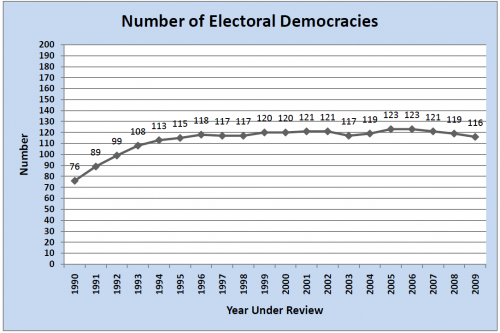
In a rather odd posting at RealClearWorld‘s Compass blog titled “Defense Spending and Freedom,” Greg Scoblette argues:
If I’m reading this op-ed from Danielle Pletka and Thomas Donnelly correctly it sounds like they don’t want the Republican party (or the Tea Party) to cut defense spending. Which is fine, so far as it goes. But they also seem to insist that the desire not to cut defense spending is somehow tied to protecting “freedom” at home and abroad.
Is there a correlation between U.S. defense spending and global freedom? There doesn’t appear to be: in the period 1990-2000, as U.S. defense budgets fell, the number of countries ranked “free” by Freedom House grew slightly. Since 2000, as defense budgets grew, the number of countries ranked “free” stayed pretty much the same – the trend lines toward greater global freedom had actually turned negative during the years 2006-2009.
In other words, if you want to make an argument for why the U.S. should continue to devote plus or minus X amount of dollars to defense expenditures, I don’t think “freedom” has much to do with the case one way or the other.
Now, there are plenty of arguments one could muster against Pletka and Donnelly’s rather disjointed piece, which intermixes seemingly random arguments about American foreign and domestic policy into an odd brew. As best I can decipher it, Pletka and Donnelly are arguing that America needs to continue to exert strong international leadership and be willing to use military force to promote democracy. That is, they’re making the standard Neoconservative case. As a Realist, I’m highly skeptical of that argument. And, goodness knows, I find the argument that our freedom is at stake in Afghanistan rather dubious.
But Scoblette’s rejoinder misses the mark.
First off, Pletka and Donnelly’s “freedom” argument isn’t about some vague notions of the overall amount of it on the planet as measured by Freedom House. They’re exhorting their countrymen to fight terrorism and the forces of extremism head on in foreign lands.
But even if we allow Scoblette to argue against Pletka and Donnelly with his own definitions, he misses the mark. We’ve massively increased defense spending and expeditionary activity over the past three decades and the trendlines are in the direction of freedom. This chart, shows a study rise in countries Freedom House rates Free and Partly Free over the period in question:

And this one shows a generally rising trend in the number of electoral democracies:
Yes, freedom rose in the 1990s despite substantial cuts in our spending (albeit, I’d note, still to levels higher than we were spending in the 1970s). But this was in good measure because of the collapse of the Soviet Union, which led to the democratization of much of the former Communist Bloc. Indeed, many of those countries have gone on to join NATO and/or the European Union. And, while the end of the Cold War had many complicated, intertwined causes, surely the defense buildup under and strong pressure from Presidents Reagan and Bush 41 had something to do with it. That’s a point for Pletka and Donnelly, not a refutation.
To be sure, freedom and democratization have ebbed and flowed a bit over the last decade. And, yes, they’ve fallen off ever-so-slightly the last couple of years. But it’s hard to see how that undermines the neoconservative case. According to Freedom House,
In a year marked by intensified repression against human rights defenders and civic activists, declines for freedom were registered in 40 countries in Africa, Latin America, the Middle East, and the former Soviet Union, representing 20 percent of the world’s total polities. Authoritarian states including Iran, Russia, Venezuela, and Vietnam became more repressive. Declines in freedom also occurred in countries that had registered positive trends in previous years, including Bahrain, Jordan, Kenya, and Kyrgyzstan.
In what sense has America’s defense budget been used to affect the level of freedom in any of those countries? Meanwhile, both Iraq and Afghanistan, while still far from “free” because of corruption and insurgent violence, nonetheless get much better ratings than they were before the U.S. invasions. Even with the rather obvious problems, they have something much closer to free and open elections and constitutional government than they did a decade ago.
Not even the most enthusiastic neocons are up for overthrowing every repressive regime on the planet. Presumably, though, Pletka and Donnelly would argue that we’ve got a better chance of enhancing freedom in places that do impact America’s global interests — Russia, Iran, and Venezuala would seem to be obvious candidates on the list above — with the ability and willingness to project power than through retrenchment.
James Joyner is managing editor of the Atlantic Council.
Image: defense-spending_0.jpg

